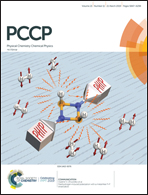Energetics of ice nucleation in mesoporous titania using positron annihilation spectroscopy†
Abstract
The low temperature behavior of water and kinetics of ice nucleation in titania mesopores have been probed by positron annihilation lifetime spectroscopy as a function of pore filling. It is revealed that water undergoes complete freezing at around 220 K when more than 50% of the pore volume is filled and such freezing is hindered at lower hydration levels. A model describing progressive trapping of positronium by ice nuclei in liquid water during the phase transition is employed to estimate the energy associated with the nucleation under confinement. It is observed that the energy for ice nucleation in confinement is less than the activation energy for nucleation in bulk water because of the surface assisted nucleation inside the pore. Interestingly, energy for nucleation is seen to decrease with the lowering of hydration level and ascribed to the curtailed hydrogen bonding network of water at lower pore filling.



 Please wait while we load your content...
Please wait while we load your content...